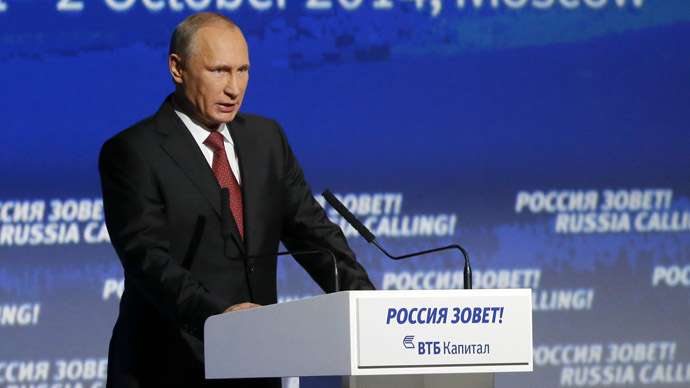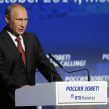
Putin Suggests Own Terms for a Dialogue With Ukraine
Publication: Eurasia Daily Monitor Volume: 11 Issue: 175
By:

Addressing an international investment forum in Moscow yesterday, Russian President Vladimir Putin adopted an unusually restrained tone toward Ukraine. In effect, Putin seems to suggest a framework for political dialogue toward stabilizing Russia-Ukraine relations (kremlin.ru, Interfax, October 2).
Putin’s salient propositions are:
1) “It is in Russia’s national interest that Ukraine should overcome its deep political and economic crisis” and “become a reliable, stable partner and neighbor to Russia.” 2) “Despite that whole tragedy [unspecified] in Ukraine’s south and east, the Ukrainian people always were and remain our closest brotherly people… Russia and Ukraine are linked in an ethnic, spiritual, religious, and historical community. Precisely on this basis I hope that we shall develop our relations in the future, and we shall do our best that this should come to pass as soon as possible.” 3) According to Putin, “everyone in any corner of Ukraine should enjoy full rights, as provided by international and Ukrainian laws, without discrimination on ethnic or linguistic grounds.” 4) “Only in that way [non-discrimination] can the country’s territorial integrity be preserved, only in that way is it possible to revert to the country’s unity.” 5) Putin is “hopeful that Ukraine’s parliamentary elections are held successfully, that the long-awaited stabilization finally comes to Ukraine” (kremlin.ru, Interfax, October 2).
For the first time since initiating this conflict, Putin refrains from using threats and invective against Ukraine in these remarks. He falls back ostensibly on a limited, non-threatening definition of Russia’s national interest regarding Ukraine. He omits the Novorossiya project, does not claim to protect Ukraine’s “Russian-speaking population,” and does not demand “federalization” or other constitutional changes in Ukraine. He stops short of denying Ukraine’s distinct national identity outright, reverting instead to the old rhetoric about two fraternal nations.
Putin implies, furthermore, that the partition of Donbas (the Donetsk and Luhansk provinces) might be reconsidered in Ukraine’s favor (his insinuation to that effect would not apply to Crimea). He refrains from openly challenging Ukraine’s Western orientation in these remarks; nor does he brandish economic retaliation measures that would present Kyiv with a Europe versus Eurasia choice. Instead, Putin’s remarks, for the first time, hold out the possibility of cooperating with Kyiv after the elections.
The shift in Putin’s tone is, in the first place, a consequence of the armistice recently signed. The Kremlin is the sated party. It takes a pause to digest its gains on the ground in Donbas. However, Putin’s shift is timed to processes beyond the conflict theater. Those are Ukraine’s upcoming parliamentary elections (due on October 26) and the European Union’s ongoing debate about easing economic sanctions on Russia after the armistice. Russia seeks to influence the course and outcome of both of those processes. Ukrainian President Petro Poroshenko, Ukraine’s voters, and the EU (foremost, Germany) are the addressees of Putin’s October 2 message.
President Poroshenko’s eponymous bloc is projected to win a plurality of the parliament’s seats in these elections, necessitating a coalition government around the pro-presidential bloc. Political groups friendly to Russia will be marginal in Ukraine’s new parliament, and the Kremlin is adapting to this situation. Putin has announced more than once that he can work with Poroshenko, and treats him with due respect in public. The Kremlin maintains permanent communication channels with the Ukrainian presidential administrations. At the same time, Moscow denigrates Ukrainian Prime Minister Arseniy Yatsenyuk and his allies as the “party of war.” Russian authorities have launched criminal proceedings against several top officials from that team. Moscow seems to be communicating its wish to see that team excluded from Ukraine’s post-election government.
By offering to work with Poroshenko (albeit on Moscow-defined terms) while attacking Yatsenyuk’s team, Moscow seeks to split Ukraine’s pro-Western forces. It hopes thereby to isolate the president from his natural allies in the government and parliament, and slow down the course of Ukraine’s reforms.
Meanwhile, the European Union discusses a possible easing of economic sanctions against Russia. Many governments in the EU regard the signing of the armistice as a sufficient basis for lifting some of those sanctions. However, German Chancellor Angela Merkel expects Russia to actually observe the armistice terms before easing the sanctions (Merkel’s position on sanctions has hardened, compared with her earlier stance). Amid continuing attacks on the Ukrainian-held Donetsk airport, Merkel asked Putin by telephone on September 30 to have those attacks stopped and to remove Russia’s forces from Ukrainian territory, as per the armistice agreement. She told Putin that sanctions could only be lifted when Russia adheres to the armistice terms (bundeskanzlerin.de, October 1).
The Kremlin has apparently concluded that it needs to display at least a modicum of willingness to engage with Kyiv; specifically with the presidency there. Such a dialogue, if persisted with, could earn at least a degree of Russian influence on Ukrainian and EU internal processes related to Russia. The Kremlin hopes for a political dialogue with Kyiv on Kremlin-defined terms. Hence Putin’s semi-overture on October 2.
Apparently, Putin seeks to involve Poroshenko into exchanging public conciliatory messages that would tacitly go along with the new post-armistice status quo. Such an exchange, if it materializes, would alienate many of Poroshenko’s supporters from him at the height of the electoral campaign. It would also help Putin’s case for easing the EU sanctions on Russia, without giving up the short-term war gains in Donbas or the long-term goals to stop Ukraine’s westward course.




